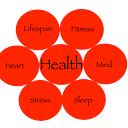Blood Pressure — A New Understanding
Blood Pressure (BP) is far more important than previously recognized. Elevated BP is well known to be associated with heart disease, stroke, kidney failure, eye disease, cognitive decline and dementia. However Blood Pressure is now understood to be an indicator of overall health and expected lifespan through its relationship with spinal flexibility and mobility of the body’s core regions (Core Mobility).
With youth and good Core Mobility each breath acts as an engine of health. With a flexible spine, rib cage and diaphragm muscle each breath will compress and release the internal organs in a sponge like manner, promoting organ microcirculation organ function. With good Core Mobility each breath also pumps fluid to the brain, nourishing and cleaning the Central Nervous System. Proper flow of fluid up the spine to the brain allows us to feel energetic, with good concentration and memory. With increasing core stiffness and decreased Core Mobility there is decreased breath-by-breath promotion of organ microcirculation and reduced flow of fluid up the spine to the brain associated with slow deterioration in health, decline in brain function and reduced lifespan.
Doctors have in the past thought that narrowed arteries forced the heart to pump harder resulting in High BP. Treatment focused on relaxing tight arteries in order to lower BP. However, over the past twenty years it has become clear that High BP occurs as a result of stiffening of the Aorta, the body’s largest artery, located immediately in front of the spinal column. Increased Aortic Stiffness is related to spinal flexibility and High BP. Aortic Stiffness and High BP are both measures of Core Mobility.
Improving Core Mobility, leading to improved health and longer lifespan, is dependent on improving spinal flexibility. One of the key reasons people lose spinal flexibility and Core Mobility is through weight gain.
Weight loss is well known to consistently reduce BP. Many patients in my medical practice have been able to stop their High BP meds after losing weight. The picture below shows how with weight gain the forward and backward curvatures of the spine become exaggerated and the spine loses its alignment and its flexibility.
To lose weight, avoid difficult to follow diets and gradually adjust your daily meals and eating habits. One suggested approach is to adhere to a few common sense rules. 1) The carbohydrate portion of your meals should be no larger than your fist. 2) Avoid use of phones and other devices while eating. Eat slowly and consciously, enjoying every bite. 3) High calorie snacks after supper should be avoided.
Exercise to improve Core Mobility does not have to be difficult and certainly does not require membership at a fitness club or purchase of any equipment. Walking is the best exercise and walking at a brisk pace in a park like setting, (ideally with slightly uneven, softer ground that has some uphill and downhill sections) will invigorate every tissue in your body and improve Core Mobility. Going for a 1/2 hr walk three times a week will lead to healthy transformation.
Another simple way to maintain Core Mobility is to place a new set of cushiony insoles in your shoes every three months. The human body is designed for slightly compressible and uneven ground. The body’s tissues are punished and traumatized by impact forces generated when we walk on hard, flat surfaces. These impact forces cause micro-years in the soft tissues, leading to inflammation and replacement of elastic fibres with stiffer tissue elements.
Taking a few minutes a day to do deep breathing expands the rib cage, releases the diaphragm muscle and loosens the spine, increasing Core Mobility.
In summary, Blood Pressure is a very important and instructive metric. Lowering your Blood Pressure by achieving a healthy weight and participating in regular gentle exercise will improve Core Mobilization, helping you feel better and live longer.
Jess Goodman MD
Chief Science Officer
VitalSines
goiheart.com
